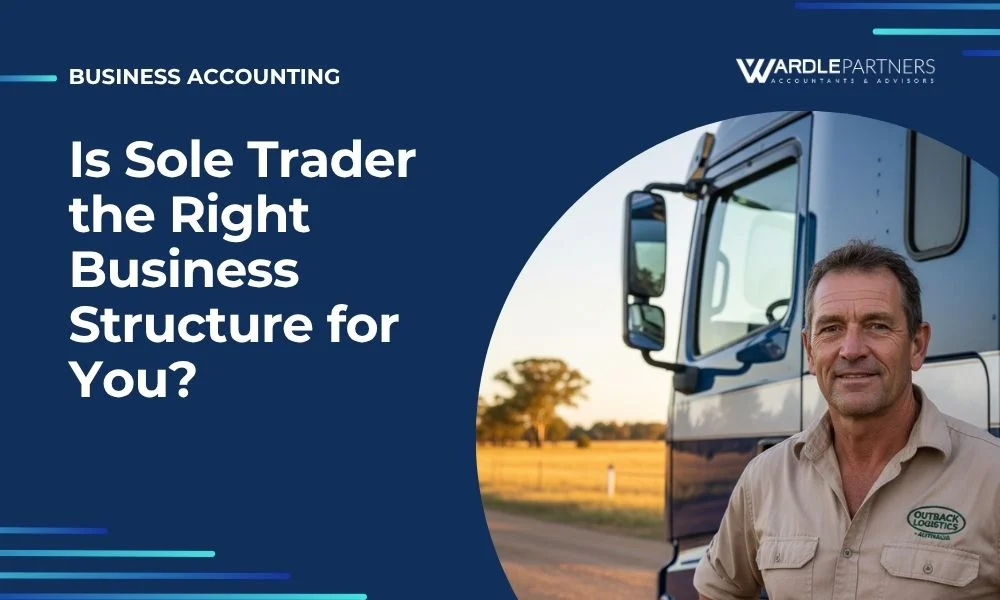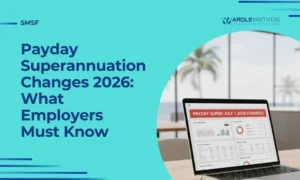Dreaming of being your own boss? Want to start a business without the complexity of partnerships or company structures? Becoming a sole trader might be the perfect fit for you.
In this ultimate guide, we’ll break down what you need to know about being a sole trader in Australia—the perks, the pitfalls, and how to set yourself up for success in 2025/26. Let’s dive in.
What Is a Sole Trader?
A sole trader is the simplest business structure you can have. It’s just you, running the show—no shareholders, no partners, just full control over your business. Whether you’re a tradie, a freelancer, or a small business owner, this structure offers flexibility and straightforward management.
As a sole trader in Australia, you use your personal Tax File Number (TFN) for business transactions and must register for an Australian Business Number (ABN). If your business earns over $75,000 per year, you’ll also need to register for Goods and Services Tax (GST) as well.
But is this structure right for you? Let’s explore the advantages and challenges.

The Perks of Being a Sole Trader
1. Easy Setup – Registering as a sole trader is quick, affordable, and hassle-free. You only need an ABN, which you can apply for online within minutes. No complex paperwork, no legal red tape.
2. Full Control – You call the shots. No need to consult partners or shareholders—every decision is yours, allowing for agility and quick action in your business.
3. Tax Benefits – Sole traders report business income on their personal tax return, often reducing admin costs. Plus, you can claim business expenses (e.g., equipment, office supplies, vehicle expenses) to lower your taxable income.
4. Flexibility – Need to pivot or scale down? Sole traders can easily adjust their business operations without going through complicated restructuring processes.
5. Keep All Profits – Unlike companies that distribute earnings among shareholders, as a sole trader, every dollar you make stays in your pocket (after tax, of course!).
Challenges to Consider
While being a sole trader is great for flexibility, it does come with a few challenges:
1. Unlimited Liability – Your personal assets (like your home or car) could be at risk if your business faces financial trouble. Unlike a company, there’s no legal separation between you and your business.
2. Work-Life Balance – Running a business solo means wearing multiple hats—sales, marketing, customer service, and bookkeeping. It can be exhausting without proper time management.
3. Scaling Limitations – Expanding a sole trader business can be tricky. Hiring employees or bringing in investors often requires transitioning to a company structure.
4. Limited Resources – Sole traders may find it harder to secure funding compared to companies, as banks and investors often favour businesses with a separate legal structure.
Key Legal and Tax Responsibilities
Running a business as a sole trader comes with financial and legal obligations you can’t afford to ignore. Here’s what you need to stay compliant:
1. Tax Obligations – You must report your business income in the business schedule of your individual tax return. If your turnover exceeds $75,000 annually, you’ll need to register for and pay GST, and lodge periodic business activity statements.
2. Record Keeping – The ATO requires sole traders to maintain accurate records of income, expenses, and invoices. Good record-keeping helps with tax deductions and business planning.
3. Superannuation – Sole traders are not required to legally pay super to themselves, so it’s wise to contribute to a super fund to secure your future financial stability.
4. Business Name Registration – If you trade under a name other than your own, you must register a business name with ASIC.
5. Insurance – Since sole traders are personally liable for debts and legal issues, having business insurance (such as public liability and income protection) is crucial.
How to Set Yourself Up for Success as a Sole Trader
Want to make your sole trader business thrive? Follow these essential steps:
Step 1: Register Your Business
- Apply for an ABN at the Australian Business Register website.
- Register a business name if it’s different from your personal name.
- Consider registering for GST if you expect to earn over $75,000 per year.
Step 2: Set Up a Business Bank Account
Keep your personal and business finances separate. A dedicated business account helps track income, manage expenses, and simplifies tax time.
Step 3: Stay on Top of Bookkeeping
- Use accounting software like Xero to keep records accurate and up to date.
- Keep receipts and track deductions to minimise your taxable income.
Step 4: Plan for Taxes
- Set aside money for tax payments—don’t wait until tax time to scramble for funds.
- Consider making quarterly PAYG instalments to avoid a large tax bill.
Step 5: Market Your Business
- Build a strong online presence with a website and social media.
- Leverage word-of-mouth referrals—your reputation is your best marketing tool.
- Network with industry peers and join local business groups.
Step 6: Protect Your Business
- Get insurance (public liability, income protection, professional indemnity).
- Have contracts in place for client agreements.
- Consider legal advice for risk management.
How Wardle Partners Accountants & Advisors Can Help
At Wardle Partners Accountants & Advisors, we’ve helped countless sole traders on the Sunshine Coast turn their business dreams into reality. From setting up your ABN to managing tax obligations, we make the process simple and stress-free. If you are currently a sole trader and you feel this business structure may not be right for you, we can talk to you about restructuring too.
Our expert team can help you with:
- Identifying deductible expenses to reduce tax
- Managing cash flow and budgeting
- Navigating GST registration
- Setting up a streamlined record-keeping system
- Tax planning strategies to maximise your earnings
Running a business solo doesn’t mean doing it alone. Let our team guide you towards success!
Ready to Get Started?
Take the leap and become your own boss. With the right support and knowledge, you can build a business that works for you.
Need expert advice? Contact Wardle Partners Accountants & Advisors today and let’s make your business a success in 2025/26.







